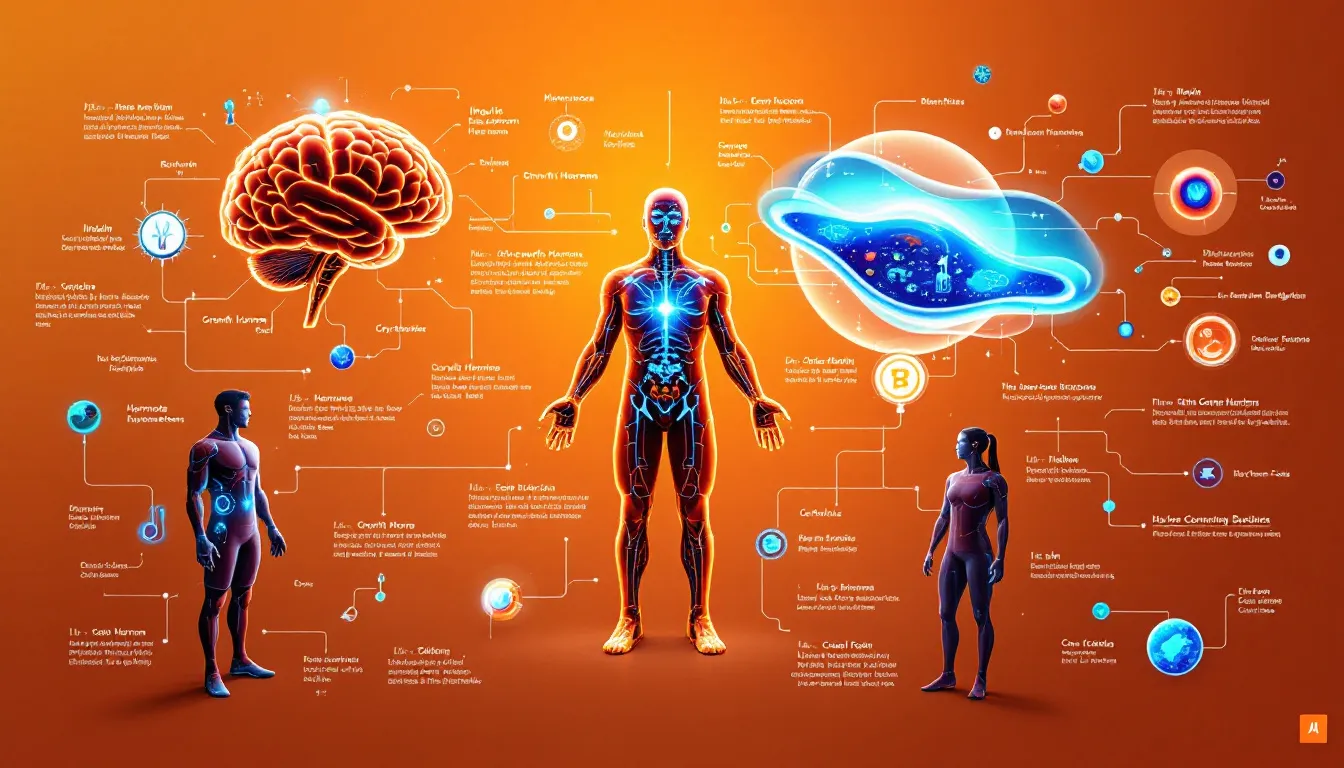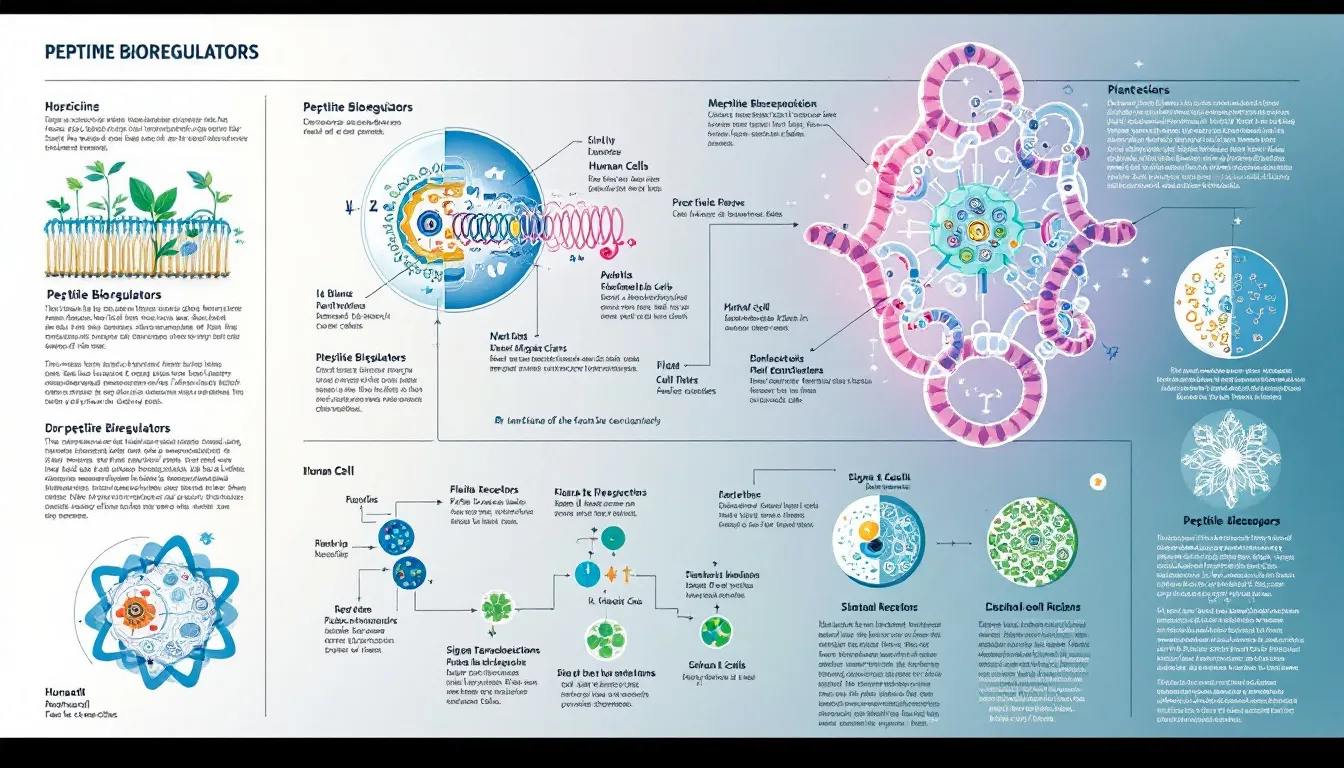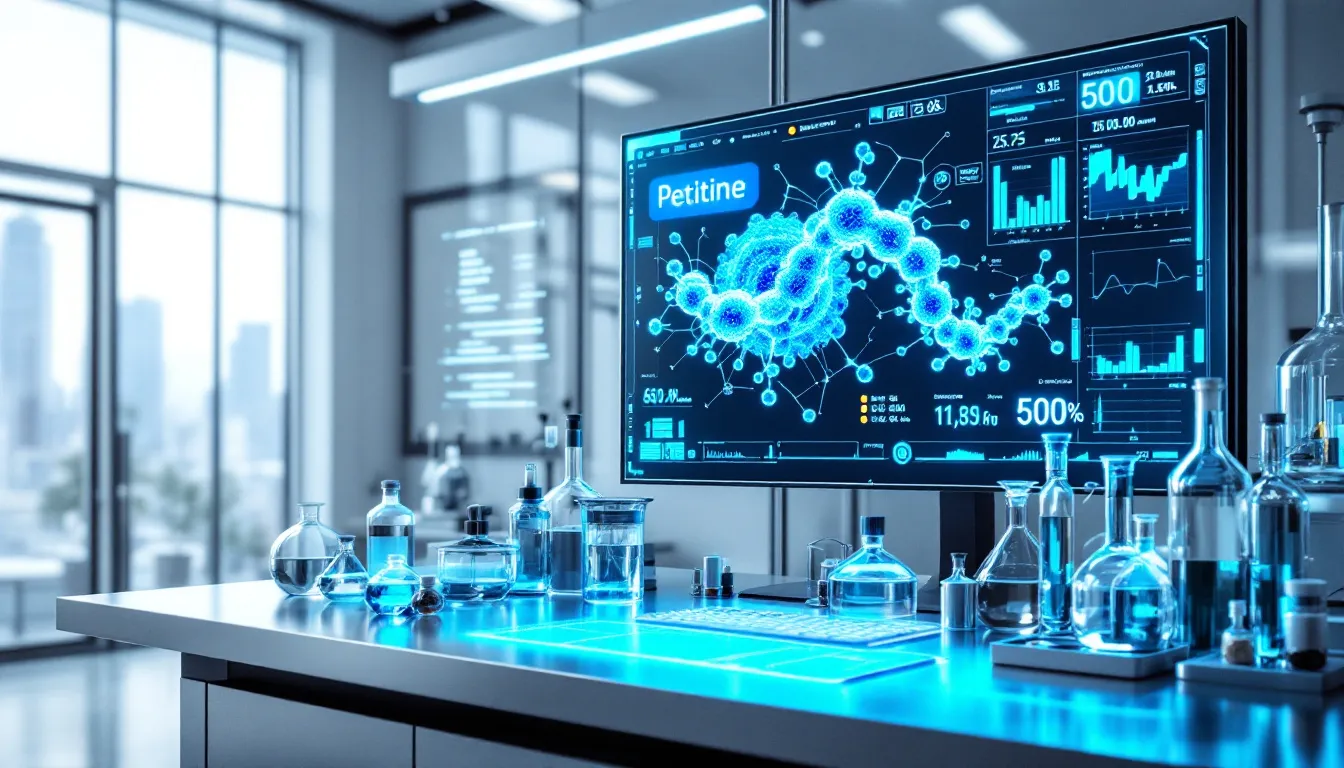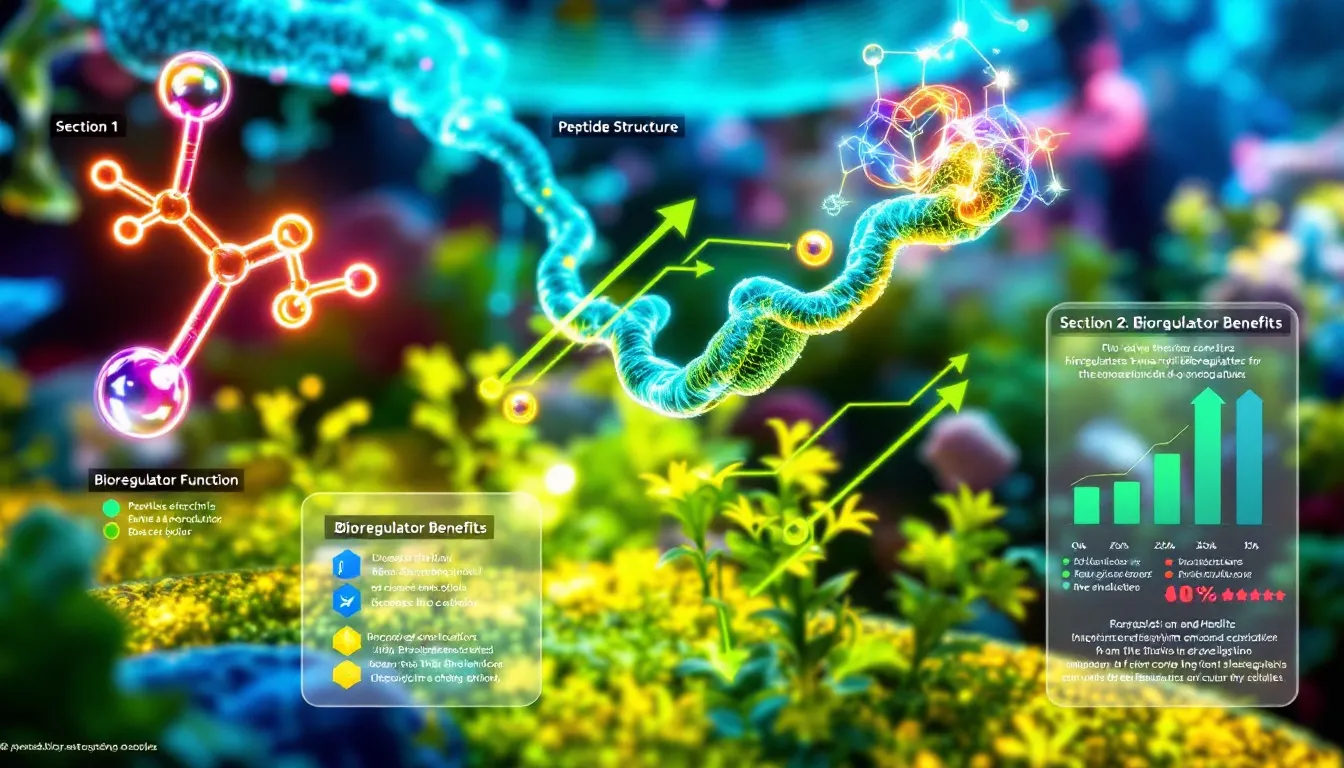Bioregulators are small proteins that activate cellular regeneration by interacting with DNA. They enhance health and longevity by serving as epigenetic switches. The action of bioregulators involves modulating cell signaling pathways, influencing gene regulation, and producing specific functional outcomes within the body. This article explains what bioregulators do, the science behind them, and their potential benefits.
Introduction to Bioregulators
Bioregulators, particularly peptide bioregulators, are naturally occurring molecules in the human body that play a vital role in maintaining health and supporting overall well-being. These compounds are made up of short chains of amino acids, allowing them to interact directly with specific sections of DNA. Through this interaction, bioregulator peptides help control gene expression and protein synthesis, which are essential for cellular regeneration and the optimal function of organs.
The significance of bioregulators was first recognized during the Cold War, when Professor Vladimir Khavinson and his team began researching ways to combat premature aging among Russian military personnel. Their groundbreaking work led to the discovery that each organ in the human body contains a unique biological reserve of peptides. This reserve is crucial for maintaining peak physical performance and supporting the body’s natural healing properties. Research has shown that when the peptide bioregulator presence in organs is at its optimal level—around 42%—the body is better equipped to resist aging and maintain vitality.
By contributing to the regulation of vital physiological processes, bioregulator peptides have become a promising focus in the study of longevity, life extension, and the prevention of age-related decline. Their ability to support cellular regeneration and enhance human health continues to drive research and innovation in this exciting field.
Key Takeaways
- Peptide bioregulators are small proteins that enhance cellular regeneration by regulating gene expression and may improve sleep quality, cognitive function, and overall health.
- Research indicates that these bioregulators, such as Epitalon, can significantly promote longevity in animal studies by improving vital organ function and reducing markers of aging.
- Quality and purity are critical when selecting peptide bioregulators for research, with Loti Labs ensuring strict adherence to Good Manufacturing Practices and rigorous testing methods.
What Are Bioregulators?

Peptide bioregulators are tiny proteins that act as epigenetic switches within cells, rejuvenating tissues and organs by interacting with DNA to regulate gene expression and protein synthesis. These peptides play a crucial role in cellular regeneration, offering a potential pathway to enhance overall well-being and longevity. All products sold by Wholesale Peptide are strictly for research purposes and not for human use.
Research suggests that these bioregulators can significantly improve sleep quality, which is vital for maintaining overall health. These peptides may enhance cognitive function and memory, particularly in older populations, by optimizing the body’s natural processes. This makes them a valuable asset in the field of anti-aging research.
Peptide bioregulators are considered safe for research use, with no reported side effects or allergies, highlighting their favorable safety profile compared to other treatments.
Peptide bioregulators work by entering cells and interacting with specific DNA sections to activate genes responsible for cellular regeneration. This interaction helps regulate various biological functions, contributing to the maintenance and repair of tissues and organs. As researchers continue to explore the potential of these peptides, their significance in the scientific community becomes increasingly evident.
The Science Behind Peptide Bioregulators

At the heart of peptide bioregulators lies a fascinating scientific mechanism. These peptides are composed of short chains of amino acids that directly influence gene expression. Peptide bioregulators can determine which genes are transcribed into proteins by modulating methylation patterns on DNA, thus playing a pivotal role in cellular activities and regeneration.
Peptide bioregulators communicate with specific DNA sections to activate genes responsible for cellular regeneration, as shown in studies. This process is crucial for maintaining the body’s optimal function, as it helps in the activation, repair, and renewal of tissues. The ability of these peptides to influence gene expression underscores their potential in various research applications, particularly in the study of aging and disease.
Peptide bioregulators are not just limited to internal cellular functions; they also have implications for skin regeneration and other external biological processes. These short peptides can contribute to the overall health and vitality of organisms by affecting protein synthesis and cellular activities. This makes them a significant area of interest for researchers looking to understand and harness the power of these molecules.
Historical Context: Discovery and Research
The discovery of peptide bioregulators dates back to the Cold War era, with Russian scientists leading the charge in exploring these compounds’ potential. One of the most notable figures in this field is Dr. Vladimir Khavinson, whose extensive research has highlighted the role of peptide bioregulators in promoting longevity and health. His work has laid the foundation for understanding how these peptides can be harnessed to support optimal biological functions.
Professor Khavinson’s research revealed that each organ contains a natural reservoir of peptides that promote its optimal functioning. This discovery has been pivotal in recognizing the potential of bioregulator peptides in maintaining and restore human health. Over the decades, these peptides have been used in various countries, demonstrating their long-standing safety and efficacy.
Other prominent researchers have also made significant contributions to the field of peptide bioregulators. Iordanishvili AK is recognized for long-term studies and discoveries in peptide regulation and bioregulatory therapy, particularly in gerontology and anti-aging treatments. Kuznik BI has played a key role in experimental studies and reviews on peptide bioregulators, focusing on their application in geriatric medicine and health span extension. Ryzhak GA is noted for research on gene expression, chromatin reactivation, and regenerative medicine, highlighting the biological effects and therapeutic applications of peptide bioregulators in aging and wound healing. Vasiliev MA has contributed to clinical and experimental studies on geroprotectors and anti-aging therapies, further advancing the understanding of bioregulation in aging research.
The historical context of peptide bioregulators underscores their significance in scientific research. From their initial discovery during the Cold War to their ongoing study today, these peptides have consistently shown promise in enhancing health and longevity. As we continue to explore their potential, the legacy of researchers like Dr. Khavinson serves as a testament to the importance of this field.
Applications in Animal Studies
Research indicates that peptide bioregulators can significantly enhance life span in animals, with improvements observed in controlled studies. These peptides target specific physiological processes, improving the function of vital organs such as the thymus and pineal gland. Peptide bioregulators have shown potential in promoting longevity and overall health in animal models by supporting the body’s natural mechanisms.
One notable example is Epitalon, which has demonstrated significant protective effects against oxidative stress. This peptide’s ability to mitigate oxidative damage is crucial for maintaining neuroendocrine functions related to aging. Additionally, animal studies have shown that peptide treatments can significantly improve skin health and reduce signs of aging.
All products from Loti Labs are intended for research purposes only and not for human use. These findings in animal studies highlight the potential applications of peptide bioregulators in understanding and addressing various biological processes and diseases. These results are further supported by review articles and comprehensive reviews of research on peptide bioregulators in animal studies. As research continues, the insights gained from these studies could pave the way for new discoveries and innovations in the field of bioregulation.
Types of Bioregulator Peptides
Among the various types of bioregulator peptides, Epitalon stands out as a prominent example. This tetrapeptide, composed of Ala-Glu-Asp-Gly, is synthesized based on the amino acid profile of Epithalamin, a natural peptide from the bovine pineal gland. Epitalon’s biological activities include enhancing enzyme activities crucial for cognitive function, such as acetylcholinesterase and butyrylcholinesterase.
In vitro studies have indicated that Epitalon can influence gene expression in neural tissue, highlighting its potential applications in neuroprotection and cognitive health. The historical significance of Epithalamin, first recognized over 50 years ago, further underscores the importance of this peptide in health research, with many scientists involved in its study.
Another notable bioregulator peptide is GHK-Cu, a copper-binding peptide known for its significant anti-aging, tissue regeneration, and skin health benefits. GHK-Cu’s biochemical properties support cellular rejuvenation and help maintain youthful DNA and skin integrity.
Understanding the different types of bioregulator peptides enables researchers to better explore their potential applications and benefits.
Benefits Suggested by Research

The efficacy of peptide bioregulators is supported by extensive scientific research and practical applications in various medical fields. Research suggests that these peptides may improve energy levels and physical performance, and may help restore or maintain the optimal state of organs and overall health. The tetrapeptide Epitalon, in particular, has been linked to increased telomerase activity, which may contribute to its anti-aging properties and cellular longevity.
Studies have shown that Epitalon administration can reduce markers of senescence in human mesenchymal stem cells, indicating its potential role in mitigating cellular aging. Additionally, peptide bioregulators have demonstrated the potential to enhance tissue repair and cellular regeneration, supporting overall health and longevity in this article, including the effects of pinelis yi.
While these benefits are promising, it’s important to remember that all products sold by Wholesale Peptide are intended to offer research purposes only and not for human use. The potential benefits suggested by research highlight the importance of continued study and exploration in this field.
Quality and Testing at Wholesale Peptide

At Loti Labs, quality and purity are paramount. The company guarantees a purity level exceeding 99% for all its products. This high standard is crucial as synthetic peptides may contain impurities that can impair their effectiveness, making rigorous quality control necessary. Loti Labs employs both automated and manual peptide synthesizers to ensure the highest quality in production.
The company’s quality assurance practices adhere to Good Manufacturing Practices (GMP), ensuring that peptides meet rigorous standards and are safe for research use. Each product undergoes rigorous testing using High-Performance Liquid Chromatography (HPLC) and Mass Spectrometry to verify their purity and identity. This multi-layered approach ensures that researchers receive reliable and consistent peptides for their studies.
Legal compliance is also a top priority. Loti Labs’ manufacturing practices comply with stringent quality control protocols to meet research use standards, ensuring security in the quality and reliability of the peptides researchers use in their studies.
How to Choose the Right Peptide for Your Study

Choosing the right peptide for your study involves several considerations. First, clarify whether the goal is to support a specific medical treatment or to promote overall health and wellness. Understanding the specific section research objectives can help in select the most appropriate peptide bioregulator for your study.
The effectiveness of a peptide supplement is based on its actual performance in real-world use, which can differ from the efficacy seen in clinical trials. Researchers should consider factors such as the peptide’s biological activity, purity, and compatibility with the study’s objectives. By carefully selecting the right peptide, researchers can ensure the success and accuracy of their studies.
When you shop at Loti Labs, you benefit from a reliable and secure online store. Placing an order for research peptides is convenient and protected, giving you peace of mind throughout the purchase process.
Future of Bioregulators
The future of bioregulators is filled with promise as ongoing research continues to uncover new ways these powerful molecules can enhance human health and longevity. Advances in peptide design and synthesis are enabling scientists to develop more targeted and effective bioregulator peptides, opening the door to personalized medicine and innovative treatments for a wide range of conditions.
Emerging studies are exploring how peptide bioregulators can be used to support the treatment of age-related diseases, improve organ function, and even prevent premature aging by activating the body’s natural biological reserve. Researchers are also investigating the potential of these compounds to regulate immune responses, promote skin regeneration, and support overall well-being at the cellular level.
As the field evolves, the importance of rigorous clinical research and quality assurance remains paramount. Ensuring the safety, purity, and effectiveness of peptide bioregulators will be essential as they move from laboratory research to potential therapeutic applications. With continued investment in research and development, bioregulator peptides are poised to play an increasingly important role in supporting longevity, enhancing performance, and improving quality of life for future generations.
Summary
The exploration of peptide bioregulators offers a fascinating glimpse into the potential of these tiny proteins to enhance health and longevity. From their scientific mechanisms and historical discovery to their applications in animal studies and the rigorous quality assurance at Loti Labs, these peptides represent a significant area of interest for researchers. The potential benefits suggested by research, including improved energy levels, physical performance, and anti-aging properties, highlight the importance of continued study in this field. While peptide bioregulators are not classified as medicines, they represent a promising new approach to health and longevity.
As we conclude this guide, it’s clear that peptide bioregulators hold promise for future discoveries and innovations in health research. By understanding their mechanisms, applications, and benefits, researchers can unlock new possibilities for enhancing well-being and longevity. The journey of exploring these peptides is just beginning, and the potential for new breakthroughs is boundless.
Frequently Asked Questions
What is the primary purpose of the products sold by Loti Labs?
The primary purpose of the products sold by Loti Labs is for laboratory research only. Therefore, they are not intended for any other use.
What types of applications do peptides support according to the text?
Peptides support applications in research, diagnostics, and therapeutics.
What ensures the quality of USA-made peptides according to the text?
The quality of USA-made peptides is ensured through rigorous testing and quality control processes, which comply with strict regulations and guidelines.
What is emphasized about the team at Loti Labs?
The team at Loti Labs is characterized by their extensive experience in peptide synthesis, purification, and analysis, with a strong commitment to high-quality products and exceptional customer service. For example, they specialize in peptides such as BPC-157, which are available for research purposes.
What are the benefits of buying from a USA-based supplier like Loti Labs?
Buying from a USA-based supplier like Loti Labs ensures high-quality products, reliable customer service, and the availability of peptides in bulk quantities, enhancing your purchasing experience.
